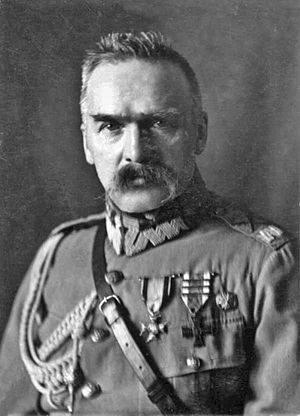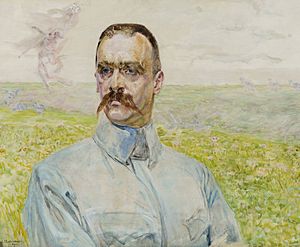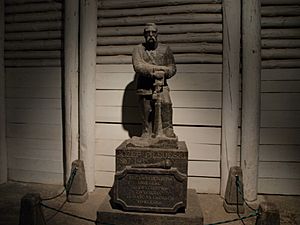Józef Piłsudski facts for kids
Quick facts for kids
Józef Piłsudski
GCTE
|
|
|---|---|
 |
|
| Chief of State of the Second Republic of Poland |
|
| In office 14 November 1918 – 11 December 1922 |
|
| Preceded by | Independence (eventually Regency Council) |
| Succeeded by | Gabriel Narutowicz (President) |
| 21st Prime Minister of Poland 20th Prime Minister of the Second Republic of Poland |
|
| In office 15 August 1930 – 4 December 1930 |
|
| President | Ignacy Mościcki |
| Preceded by | Walery Sławek |
| Succeeded by | Walery Sławek |
| 16th Prime Minister of Poland 15th Prime Minister of the Second Republic of Poland |
|
| In office 2 October 1926 – 27 June 1928 |
|
| President | Ignacy Mościcki |
| Preceded by | Kazimierz Bartel |
| Succeeded by | Kazimierz Bartel |
| General Inspector of the Armed Forces 1st General Inspector of the Armed Forces |
|
| In office 27 August 1926 – 12 May 1935 |
|
| President | Ignacy Mościcki |
| Preceded by | (post created) |
| Succeeded by | Edward Śmigły-Rydz |
| 7th Minister of Military Affairs | |
| In office 16 May 1926 – 12 May 1935 |
|
| President | Maciej Rataj (acting) Ignacy Mościcki |
| Preceded by | Juliusz Tarnawa-Malczewski |
| Succeeded by | Tadeusz Kasprzycki |
| Personal details | |
| Born |
Józef Klemens Piłsudski
5 December 1867 Zułów (Lithuanian: Zalavas), Vilna Governorate, Russian Empire (now Lithuania) |
| Died | 12 May 1935 (aged 67) Warsaw, Poland |
| Political party | None (formerly PPS) |
| Spouses | Maria Koplewska (m.1899-d.1921) Aleksandra Szczerbinska (m.1921–1935) |
| Children | Wanda Jadwiga |
| Signature | |
| Military service | |
| Allegiance | Second Polish Republic |
| Branch/service | Polish Legions Polish Army |
| Years of service | 1914–1923 1926–1935 |
| Rank | Marshal of Poland |
| Battles/wars | World War I Polish–Ukrainian War Polish–Lithuanian War Polish–Soviet War |
Józef Klemens Piłsudski (born December 5, 1867 – died May 12, 1935) was a very important Polish leader. He helped Poland become an independent country again after 123 years. From 1918 to 1922, he was the Chief of State of the Second Republic of Poland. Later, he became the First Marshal of Poland in 1920.
Piłsudski was seen as the main leader of Poland from 1926 until his death in 1935. He was also the Minister of Military Affairs. He played a huge role in Polish politics and was well-known around the world. Many people call him a "father" of the Second Polish Republic, which was re-established in 1918. Before this, Poland had been divided by Austria, Prussia, and Russia since 1795.
Piłsudski believed in a Poland where many different groups of people could live together. He hoped Poland could form a strong union with independent Lithuania and Ukraine.
Early in his career, Piłsudski became a leader of the Polish Socialist Party. He believed that Poland needed to fight for its freedom. So, he formed the Polish Legions, which were military groups. In 1914, he correctly guessed that a big war would start. He also predicted that the Russian Empire would lose to the Central Powers, and then the Central Powers would lose to the Western Allies.
When World War I began in 1914, Piłsudski's Legions fought alongside Austria-Hungary against Russia. But in 1917, when Russia was doing badly in the war, he stopped supporting the Central Powers. Because of this, the Germans put him in prison in Magdeburg.
From November 1918, when Poland became independent again, until 1922, Piłsudski was Poland's Chief of State. Between 1919 and 1921, he led Polish forces in six border wars. These wars helped set the new borders of the country. His forces were almost defeated in the Polish–Soviet War. But in August 1920, during the Battle of Warsaw, they pushed back the invading Soviet Russian forces. This was a huge victory.
In 1923, Piłsudski decided to retire from politics. This was because his opponents, especially the National Democrats, had a lot of power in the government. Three years later, he returned to power in May 1926 through a military takeover. From then until his death in 1935, he mainly focused on military and foreign affairs.
Contents
Early Life and Dreams of Freedom

Józef Piłsudski was born in Zulow (now in Lithuania). His family was Polish nobility and very patriotic, but they lived simply. He went to grammar school in Vilnius. Later, he studied at the University of Kharkov. There, he joined a secret group called "The People's Will," which was against the Russian emperor, called the tsar.
In 1887, the Tsarist authorities arrested him and sent him away to Siberia for five years. His brother, Bronislaw Pilsudski, was also involved in a revolutionary plot.
After he was released, Piłsudski learned about the socialist movement. In 1892, he helped start the PPS, which stood for the Polish Socialist Party. In 1900, he was arrested again. This time it was for being the editor of a secret newspaper called "Robotnik" (The Worker). He managed to escape from prison.
After his escape, Piłsudski started to build military groups for the party. He even carried out bank and train raids to get money. He used this money to slowly build a new revolutionary army. The main goal of his army was to gain independence from Russia.
Fighting for Poland's Independence
Before World War I, Piłsudski was a key figure. He connected and helped many military and guerrilla groups. All these groups shared one goal: to make Poland independent from the countries that controlled it.
In 1914, he created the Polish Legion. This group was the start of the modern Polish Army. He fought with Austrian and German troops against Russia. However, he did not want to take orders from the German and Austro-Hungarian commanders. Because of this, he was arrested. Later, the Treaty of Brest-Litovsk meant Russia gave up its claims to what was Polish-Russia. Germany and Austria then announced a new Kingdom of Poland.
In 1918, Piłsudski was released from prison. On November 11, he was named the temporary head of the newly formed Polish state. Piłsudski also represented Poland at the Treaty of Versailles, which ended World War I.
The Polish army, led by Piłsudski, stopped the Red Army from moving into Western Europe. He defeated the Bolshevik Army. This victory helped Poland gain a lot of land in the Treaty of Riga in 1921.
He continued to be the military leader until 1923. After three years of retirement, he returned and led a military takeover in 1926. After that, he played a very important role in Polish politics until his death.
Piłsudski's death in 1935 left a big gap in Polish leadership. It also left many problems for the newly independent Polish state to solve.
Images for kids
-
"Lingwood", Leytonstone, where Piłsudski stayed in 1900
-
Piłsudski. Painting by Jacek Malczewski, 1916
-
Ulica Mokotowska 50, Warsaw, where Piłsudski stayed 13–29 November 1918, after his release from Magdeburg
-
Piłsudski in Poznań in 1919
-
Piłsudski (left) and Edward Rydz-Śmigły (right), 1920, during Polish-Soviet War
-
Grave of Piłsudski's mother in Vilnius, Lithuania. The huge black tombstone is inscribed: "Matka i serce syna" ("A mother and the heart of [her] son") and bears evocative lines from a poem by Słowacki.
-
Statue of Piłsudski on Warsaw's Piłsudski Square—one of many statuary tributes throughout Poland
-
Contemporary caricature of Józef Piłsudski by Jerzy Szwajcer
See also
 In Spanish: Józef Piłsudski para niños
In Spanish: Józef Piłsudski para niños
 | Mary Eliza Mahoney |
 | Susie King Taylor |
 | Ida Gray |
 | Eliza Ann Grier |


















